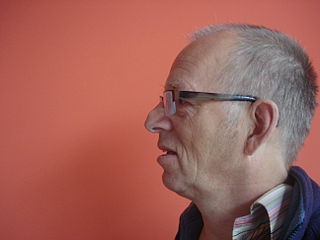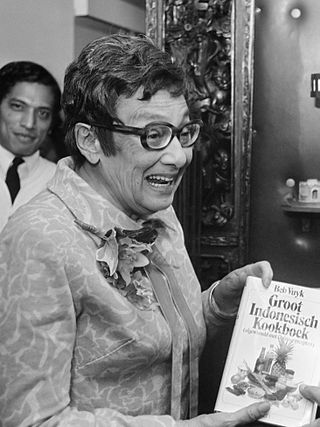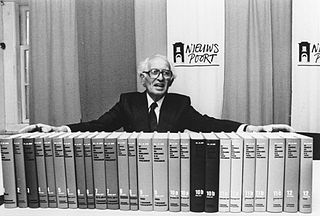
Femke Halsema is a Dutch politician and filmmaker. On 27 June 2018, she was appointed Mayor of Amsterdam and began serving a six-year term on 12 July 2018. She is the first woman to hold the position on a non-interim basis. She previously was a member of the House of Representatives for the leftist green party GroenLinks from 1998 to 2011, and served as the party's parliamentary leader from 2002 to 2010.

Helena Hubertina Johanna "Lenny" Kuhr is a Dutch singer-songwriter.

Renate Ida Rubinstein was a German-Dutch writer, journalist and columnist.
The Anne Vondeling prize, named after the politician Anne Vondeling a member of the Dutch Labour Party, is an annual award in The Netherlands given to journalists who write in a clear manner concerning political subjects.
De Groene Amsterdammer is an independent Dutch weekly news magazine published in Amsterdam. It is one of the four independent opinion magazines in the Netherlands, alongside HP/De Tijd, Vrij Nederland and Elsevier.

HP/De Tijd is a Dutch language monthly opinion magazine. Its editorial offices are in Amsterdam, Netherlands. Alongside De Groene Amsterdammer, Vrij Nederland and Elsevier, it is one of the most influential Dutch opinion magazines.
The Miss Nederland is a national Beauty pageant in the Netherlands. The pageant was founded in 1929 in Amsterdam.

HVV (Haagse Voetbal Vereniging: Dutch for is an amateur football club in The Hague, Netherlands. It was founded in 1883 as an extension of HCC, Hague Cricket Club. In 1978, on the occasion of the club's centenary, Queen Juliana granted the club royal patronage, with prefix Koninklijke, because of its pioneering role in sport, including in the formation of the Royal Dutch Football Association in 1889. Since then it has been called Koninklijke Haagse Cricket & Voetbal Vereniging, abbreviated KHC&VV. The club's grounds since 1898 have been at the 1,200-capacity "De Diepput", on the border between Benoordenhout and Wassenaar. It now also plays tennis, squash and judo and has around 1750 members.

Abraham "Bram" Peper was a Dutch politician of the Labour Party (PvdA).

Josephus Johannes Maria (Jos) van der Lans is a cultural psychologist, journalist and writer. Between 1999 and 2007 he was member of the Dutch Senate for GreenLeft
The Ereklasse is the highest tier of the national rugby union competition in the Netherlands.

Elizabeth (Beb) Vuyk was a Dutch writer of Indo (Eurasian) descent. Her Indo father was born in the Dutch East Indies and had a mother from Madura, but was ‘repatriated’ to the Netherlands on a very young age. She married into a typically Calvinist Dutch family and lived in the port city of Rotterdam. Vuyk grew up in the Netherlands and went to her father’s land of birth in 1929 at the age of 24. 3 years later she married Fernand de Willigen, a native born Indo that worked in the oil and tea plantations throughout the Indies. They had 2 sons, both born in the Dutch East Indies.

The Kingdom of the Netherlands During World War II is the standard reference on the history of the Netherlands during World War II. The series was written by Loe de Jong (1914–2005), director of the Dutch Institute for War Documentation, and was published between 1969 and 1991. The series contains 14 volumes, published in 29 parts. De Jong was commissioned to write the work in 1955 by the Ministry of Education, Culture and Science. The first volume appeared in 1969, and de Jong wrote his last in 1988. The final volume, containing critique and responses, appeared in 1991.

Radio Oranje was a Dutch radio programme on the BBC European Service broadcast to the German-occupied Netherlands during World War II. It was transmitted from London and broadcast programmes of approximately 15 minutes. It consisted of brief commentaries on current affairs and political speeches, as well as news on the Free Dutch Forces, colonies, and merchant navy. It was distinct from the BBC's own Dutch Service which only broadcast news programmes and which, unlike Radio Oranje, was not controlled by the Dutch government in exile.
Bart van Leeuwen was a Dutch photographer and author.
Klaas van Berkel is a Dutch historian, historian of science, and professor of Modern History at the University of Groningen in the Netherlands, known from his work on the history of science in the Netherlands, particularly the work of Isaac Beeckman, Simon Stevin and Eduard Jan Dijksterhuis.

Jacoba van Tongeren was a resistance fighter, the founder and leader of Group 2000, a resistance group during the Second World War. Jacoba van Tongeren is the only woman to have created and led a resistance group during the war. In 1990, Yad Vashem honoured Jacoba van Tongeren as Righteous Among the Nations.
Hans Renders is a professor of history and biography theory at the University of Groningen. Since 2004, he is also the head of the university's "Biography Institute".

Group 2000 was a Dutch resistance group during the Second World War in the Amsterdam area and remained virtually unknown for 70 years. The Group was founded in 1940 and was led by Ms. Jacoba van Tongeren during the entire war. For the duration of the Second World War she provided food coupons for around 4,500 people in hiding. Group 2000 had more than 140 members who, together with the people in hiding, remained invisible during the war, and also afterwards, through the use of 4-number codenames. This changed only in 2015, after the book ‘Jacoba van Tongeren and the unknown resistance heroes of Group 2000’ was published.

![Minister Frits Korthals Altes with the Vrij Nederland (19 May 1983) at the Tweede Kamer, next to him Onno Ruding. Both are linked by Vrij Nederland Slavenburg's bank affair [nl]. Korthals Altes, Frits - Ruding, Onno - SFA003011390.jpg](http://upload.wikimedia.org/wikipedia/commons/thumb/d/d5/Korthals_Altes%2C_Frits_-_Ruding%2C_Onno_-_SFA003011390.jpg/220px-Korthals_Altes%2C_Frits_-_Ruding%2C_Onno_-_SFA003011390.jpg)










